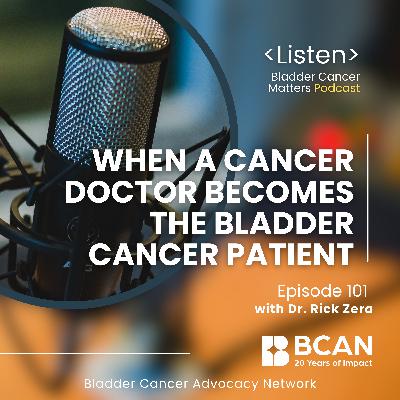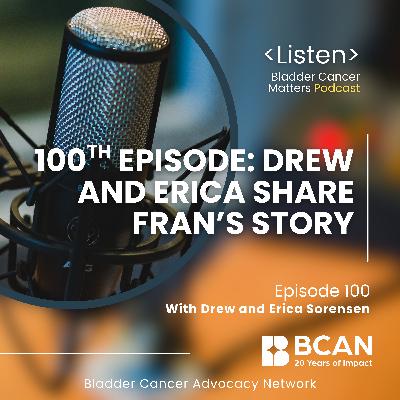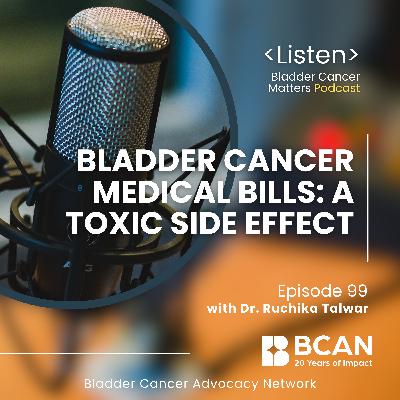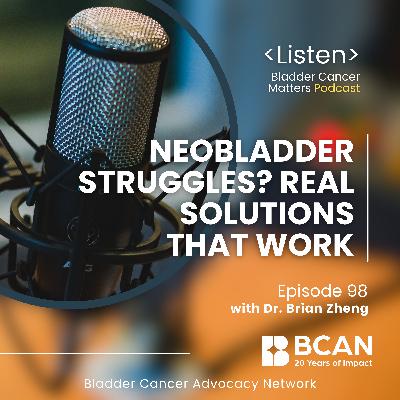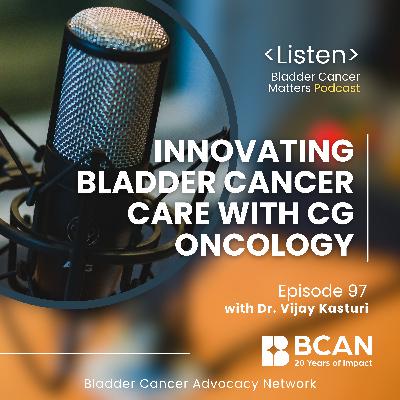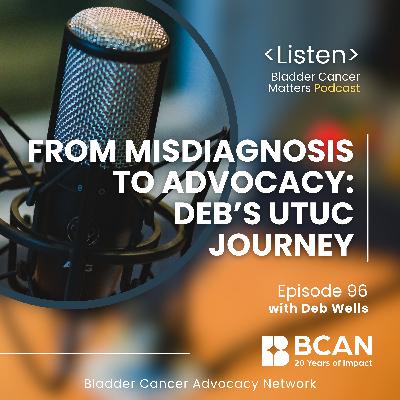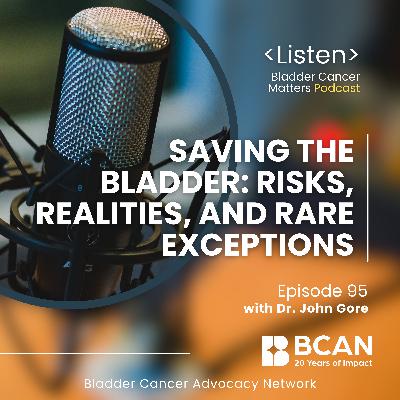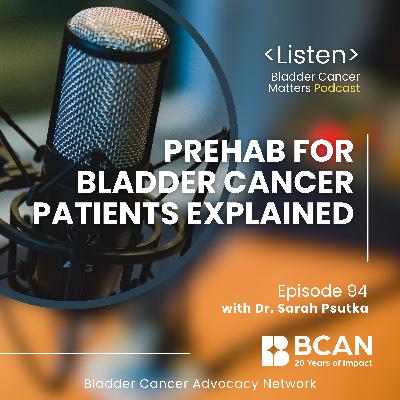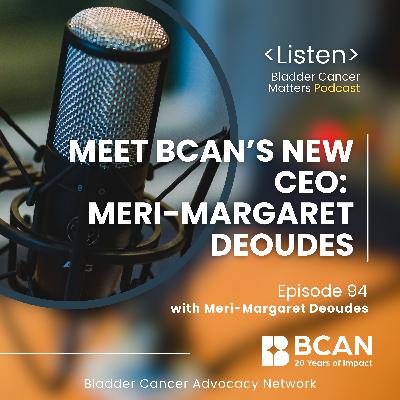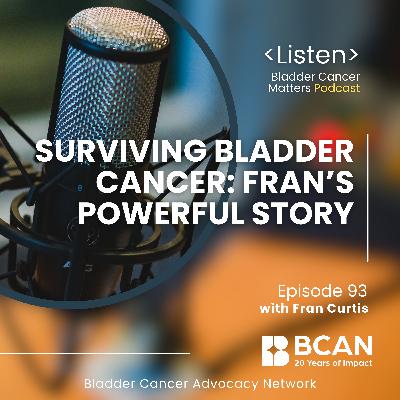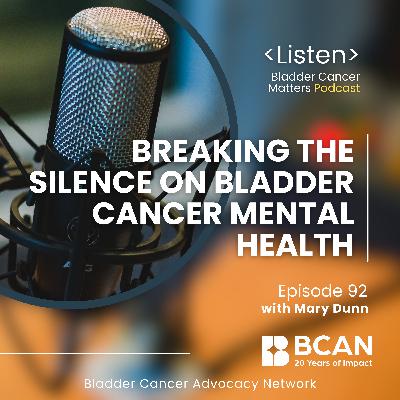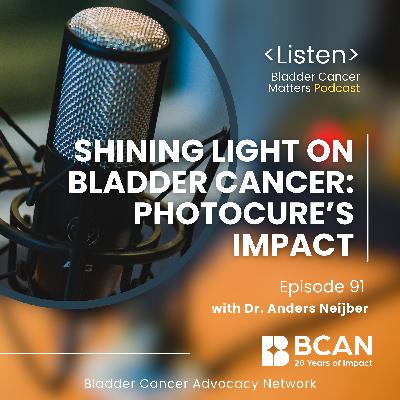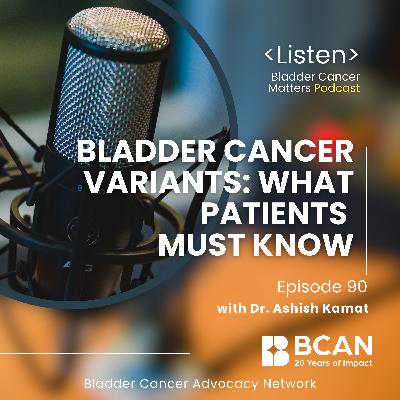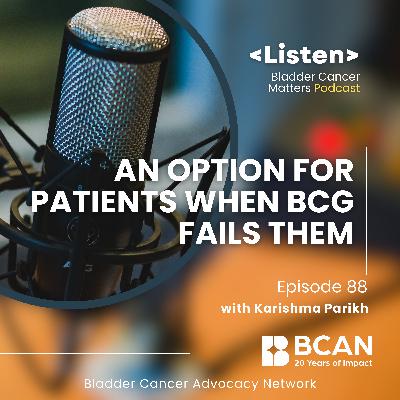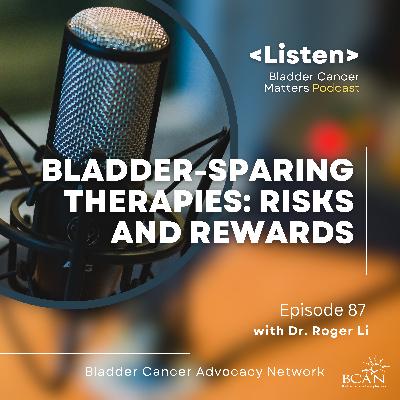Discover Bladder Cancer Matters
Bladder Cancer Matters

Bladder Cancer Matters
Author: Bladder Cancer Advocacy Network
Subscribed: 21Played: 270Subscribe
Share
© Bladder Cancer Advocacy Network, 2021
Description
Bladder Cancer Matters is the podcast for, by and about the bladder cancer community. Host Rick Bangs interviews interesting guests from the bladder cancer community, including patients, survivors, advocates, medical professionals, researchers, caregivers and more. It is brought to you by the Bladder Cancer Advocacy Network.
120 Episodes
Reverse
In this uplifting episode of Bladder Cancer Matters, survivors Sandy Weicher and Danny Gereg share how the Walk to End Bladder Cancer became the turning point they didn't know they needed—a place where strangers become family, hope replaces fear and every mile walked fuels research and critical patient programs. Sandy describes the moment she arrived at the New York City Walk, surrounded by the skyline and a sea of survivors, caregivers and clinicians, and instantly felt connected to something bigger than her diagnosis. Danny talks about showing up lost and anxious at the Columbus Walk, only to find a community that carried him through his darkest moments and inspired him to fight for his health. Together with host Rick Bangs, they show how the Walk isn't just an event—it's a lifeline, a celebration of resilience, and a reminder that no one faces bladder cancer alone. Their stories will make you smile, tear up, and—most of all—want to join in. Sign up for a 2026 Walk to End Bladder Cancer.
Three cancers. One relentless survivor. In this unforgettable episode of Bladder Cancer Matters, host Rick Bangs sits down with Lisa Savage, who reveals the shocking twists of her cancer journeys—melanoma caught just in time, a delayed and devastating bladder cancer diagnosis that led to bladder removal and a urostomy bag at age 50, and a third hidden cancer discovered along the way. With raw honesty and powerful humor, Lisa shares how she survived aggressive chemo, faced a terminal prognosis, fought through fear, and transformed her devastating diagnosis into a mission to mentor others, advocate publicly and live boldly—bag and all. Her story will make you gasp, laugh, tear up and leave inspired to face whatever life throws your way.
In this special 20th-anniversary episode of Bladder Cancer Matters, host and survivor Rick Bangs sits down with leading urologic oncologist Dr. Sia Daneshmand to explore a new bladder cancer therapy: Johnson & Johnson's newly FDA-approved INLEXZO™. Dr. Daneshmand—who helped lead its clinical trials—breaks down how this "pretzel-shaped" intravesical delivery system works, why it's showing some of the highest response rates yet for BCG-unresponsive disease and what patients can realistically expect in terms of side effects, treatment schedule, and quality of life. Together, they discuss the future of drug-delivery technology in bladder cancer and why this moment can offer hope to bladder cancer patients.
In this powerful and deeply personal episode of Bladder Cancer Matters, host Rick Bangs talks with survivor and advocate Danny Gereg, who shares how a shocking 2023 bladder cancer diagnosis became the catalyst for a total life transformation. Once diabetic, alcoholic, and obese, Danny rebuilt his body and spirit—losing over 100 pounds, reclaiming his health, and finding purpose as a voice for others navigating the challenges of cancer, sexuality, and recovery. With candor and humor, he discusses the physical and emotional realities of treatment, the life-changing support of his wife, and how BCAN's community helped him rediscover hope. This unflinching, inspiring conversation is a testament to resilience, love, and the belief that even after cancer, life can be rebuilt—stronger than ever.
In this episode of Bladder Cancer Matters, host and survivor Rick Bangs sits down with Dr. Mark Schoenberg—renowned urologist and Chief Medical Officer at UroGen® Pharma—for a wide-ranging conversation about the evolution of bladder cancer research, treatment, and patient advocacy. Dr. Schoenberg shares the story behind BCAN's founding, the early challenges of raising awareness, and the innovations that are reshaping care today, including the development of non-surgical therapies like ZUSDURI™ (mitomycin) for intravesical solution, a prescription medicine used to treat adults with a type of cancer of the lining of the bladder called low-grade intermediate-risk non-muscle invasive bladder cancer (LG-IR-NMIBC) after you have previously received bladder surgery to remove the tumor and it did not work or is no longer working. From his decades of patient-centered work to his role in pioneering new approaches with UroGen, Dr. Schoenberg offers insights into where the field has been and the promising future ahead. Tune in to hear a fascinating mix of history, science, and hope for patients and families impacted by bladder cancer. Please see the link to the full Prescribing Information on the podcast web page or available at www.zusduri.com. ZUSDURI Prescribing Information ZUSDURI Patient Information Holzbeierlein J, Bixler BR, Buckley DI, et al. Diagnosis and treatment of non-muscle invasive bladder cancer: AUA/SUO guideline: 2024 amendment. J Urol. 2024;10.1097/JU.0000000000003846. ZUSDURI (mitomycin) for intravesical solution is a prescription medicine used to treat adults with a type of cancer of the lining of the bladder called low-grade intermediate-risk non-muscle invasive bladder cancer (LG-IR-NMIBC) after you have previously received bladder surgery to remove tumor and it did not work or is no longer working. ZUSDURI™ Important Safety Information You should not receive ZUSDURI™ if you have a hole or tear (perforation) of your bladder or if you have had an allergic reaction to mitomycin or to any of the ingredients in ZUSDURI™. Before receiving ZUSDURI™, tell your healthcare provider about all of your medical conditions, including if you: have kidney problems are pregnant or plan to become pregnant. ZUSDURI™ can harm your unborn baby. You should not become pregnant during treatment with ZUSDURI™. Tell your healthcare provider right away if you become pregnant or think you may be pregnant during treatment with ZUSDURI™. Females who are able to become pregnant: You should use effective birth control (contraception) during treatment with ZUSDURI™ and for 6 months after the last dose. Males being treated with ZUSDURI™: You should use effective birth control (contraception) during treatment with ZUSDURI™ and for 3 months after the last dose. are breastfeeding or plan to breastfeed. It is not known if ZUSDURI™ passes into your breast milk. Do not breastfeed during treatment with ZUSDURI™ and for 1 week after the last dose. How will I receive ZUSDURI™? You will receive your ZUSDURI™ dose from your healthcare provider 1 time a week for 6 weeks into your bladder through a tube called a urinary catheter. It is important that you receive all 6 doses of ZUSDURI™ according to your healthcare provider's instructions. If you miss any appointments, call your healthcare provider as soon as possible to reschedule your appointment. During treatment with ZUSDURI™, your healthcare provider may tell you to take additional medicines or change how you take your current medicines. After receiving ZUSDURI™: ZUSDURI™ may cause your urine color to change to a violet to blue color. Avoid contact between your skin and urine for at least 24 hours. To urinate, males and females should sit on a toilet and flush the toilet several times after you use it. After going to the bathroom, wash your hands, your inner thighs, and genital area well with soap and water. Clothing that comes in contact with urine should be washed right away and washed separately from other clothing. The most common side effects of ZUSDURI™ include: increased blood creatinine levels, increased blood potassium levels, trouble with urination, decreased red blood cell counts, increase in certain blood liver tests, increased or decreased white blood cell counts, urinary tract infection, blood in your urine. You are encouraged to report negative side effects of prescription drugs to the FDA. Visit www.fda.gov/medwatch or call 1-800-FDA-1088. You may also report side effects to UroGen Pharma at 1-855-987-6436. Please see ZUSDURI Full Prescribing Information, including the Patient Information, for additional information. JELMYTO® Important Safety Information You should not receive JELMYTO® if you have a hole or tear (perforation) of your bladder or upper urinary tract. Before receiving JELMYTO®, tell your healthcare provider about all your medical conditions, including if you are pregnant or plan to become pregnant. JELMYTO® can harm your unborn baby. You should not become pregnant during treatment with JELMYTO®. Tell your healthcare provider right away if you become pregnant or think you may be pregnant during treatment with JELMYTO®. Females who are able to become pregnant: You should use effective birth control (contraception) during treatment with JELMYTO® and for 6 months after the last dose. Males being treated with JELMYTO®: If you have a female partner who is able to become pregnant, you should use effective birth control (contraception) during treatment with JELMYTO® and for 3 months after the last dose. are breastfeeding or plan to breastfeed. It is not known if JELMYTO® passes into your breast milk. Do not breastfeed during treatment with JELMYTO® and for 1 week after the last dose. Tell your healthcare provider if you take water pills (diuretic). How will I receive JELMYTO®? Your healthcare provider will tell you to take a medicine called sodium bicarbonate before each JELMYTO® treatment. You will receive your JELMYTO® dose from your healthcare provider 1 time a week for 6 weeks. It is important that you receive all 6 doses of JELMYTO® according to your healthcare provider's instructions. If you miss any appointments, call your healthcare provider as soon as possible to reschedule your appointment. Your healthcare provider may recommend up to an additional 11 monthly doses. JELMYTO® is given to your kidney through a tube called a catheter. During treatment with JELMYTO®, your healthcare provider may tell you to take additional medicines or change how you take your current medicines. After receiving JELMYTO®: JELMYTO® may cause your urine color to change to a violet to blue color. Avoid contact between your skin and urine for at least 6 hours. To urinate, males and females should sit on a toilet and flush the toilet several times after you use it. After going to the bathroom, wash your hands, your inner thighs, and genital area well with soap and water. Clothing that comes in contact with urine should be washed right away and washed separately from other clothing. JELMYTO® may cause serious side effects, including: Swelling and narrowing of the tube that carries urine from the kidney to the bladder (ureteric obstruction). If you develop swelling and narrowing, and to protect your kidney from damage, your healthcare provider may recommend the placement of a small plastic tube (stent) in the ureter to help the kidney drain. Tell your healthcare provider right away if you develop side pain or fever during treatment with JELMYTO®. Bone marrow problems. JELMYTO® can affect your bone marrow and can cause a decrease in your white blood cell, red blood cell, and platelet counts. Your healthcare provider will do blood tests prior to each treatment to check your blood cell counts during treatment with JELMYTO®. Your healthcare provider may need to temporarily or permanently stop JELMYTO® if you develop bone marrow problems during treatment with JELMYTO®. The most common side effects of JELMYTO® include: urinary tract infection, blood in your urine, side pain, nausea, trouble with urination, kidney problems, vomiting, tiredness, stomach (abdomen) pain. You are encouraged to report negative side effects of prescription drugs to the FDA. Visit http://www.fda.gov/medwatch or call 1-800-FDA-1088. You may also report side effects to UroGen Pharma at 1-855-987-6436. Please click here for JELMYTO® Full Prescribing Information, including the Patient Information, for additional information.
In this powerful episode of Bladder Cancer Matters, host Rick Bangs welcomes Dr. Rick Zera, a retired surgical oncologist who spent decades treating breast cancer before unexpectedly becoming a bladder cancer patient himself. Dr. Zera shares his remarkable story of moving from the operating room to the patient's chair, beginning with a shocking diagnosis of an extremely rare and aggressive bladder cancer. He speaks candidly about the delays and frustrations he faced in getting timely care, the difficult choices between treatment options, and the emotional toll of navigating his own cancer journey after a career spent guiding others through theirs. What follows is an honest, deeply human conversation about risk, resilience, and perspective. Dr. Zera reflects on what he learned about himself, his colleagues, and the vital role of support systems—from family and friends to social workers and fellow patients.
Bladder Cancer Matters just hit a huge milestone—our 100th episode! In this special 20th anniversary edition of our Partners in Progress series, host Rick Bangs talks with Drew and Erica, whose mom Fran is living with bladder cancer, about what it means to be a caregiver. From music-filled car rides to difficult treatment decisions, they share honest, heartfelt stories of resilience, laughter, hope and the power of family. 💙 Tune in and be inspired by their journey—and celebrate this milestone with us!
In this powerful episode of Bladder Cancer Matters, host Rick Bangs sits down with Dr. Ruchika Talwar, a leading urologic oncologist and health policy expert, to tackle the growing issue of financial toxicity in bladder cancer care. With candid insights and clear explanations, Dr. Talwar breaks down the hidden and rising costs patients face—from co-pays and lost wages to caregiver burdens and high drug prices—and explains why bladder cancer is the most expensive cancer per patient in the U.S. Listeners will gain practical tips to navigate the system, avoid financial pitfalls, and advocate for support—all while learning why open conversations with healthcare providers matter more than ever. Whether you're a patient, caregiver, or healthcare professional, this episode sheds light on a critical but often overlooked side effect of cancer: the financial toll. Don't miss this eye-opening discussion.
In this powerful episode of Bladder Cancer Matters, host and survivor Rick Bangs sits down with Dr. Brian Zheng of Brigham and Women's Hospital and Harvard Medical School to explore a deeply personal yet often overlooked topic: life after a radical cystectomy. Dr. Zheng shares candid insights on the different types of incontinence, how they uniquely affect men and women, and—most importantly—practical tips and treatment options that can dramatically improve quality of life. From behavioral changes and physical therapy to products, medications, and surgical solutions, this episode arms listeners with actionable advice and much-needed hope. If you or a loved one are living with a neobladder, this is an essential listen.
In this compelling episode of Bladder Cancer Matters, host Rick Bangs sits down with Dr. Vijay Kasturi, Chief Medical Officer at CG Oncology, for a must-hear conversation that blends science, heart, and hope. From the personal loss that fuels his passion to the groundbreaking clinical trials underway for Cretostimogene—an innovative investigational therapy targeting non-muscle invasive bladder cancer—Dr. Kasturi offers a behind-the-scenes look at how CG Oncology is working to change the game for patients. Whether you're a patient, caregiver, clinician, or advocate, this episode delivers crucial insights into new horizons for bladder cancer treatment.
In this powerful episode of Bladder Cancer Matters, host Rick Bangs talks with Deb Wells, a survivor of high-grade upper tract urothelial cancer (UTUC), who shares her emotional and eye-opening journey to diagnosis and treatment. After months of misdiagnoses and repeated ER visits, Deb finally learned the truth behind her symptoms—an experience that will resonate with many bladder cancer patients, especially women. She opens up about the importance of being an informed patient, finding the right medical team, and leaning on a support system when facing uncertainty. Deb's story is both inspiring and practical, filled with advice for navigating complex medical decisions, coping with treatment side effects, and embracing life during and after cancer. If you or someone you love has been impacted by bladder or upper tract urothelial cancer, this episode offers hope, clarity, and a powerful reminder that no one has to face this journey alone. Don't miss this honest and uplifting conversation.
Can you really just take out part of the bladder? It's one of the most common questions bladder cancer surgeons hear—and in this episode of Bladder Cancer Matters, host Rick Bangs sits down with renowned urologic oncologist Dr. John Gore to break it all down. From TURBTs to partial cystectomies, they explore when bladder-sparing approaches are appropriate, what the real risks and benefits are, and how treatment choices affect long-term outcomes. Whether you're a patient, caregiver, or advocate, this episode is packed with the kind of honest, expert insight that can help you make more informed decisions.
Can personalized exercise improve recovery after bladder cancer surgery? In our latest Bladder Cancer Matters podcast, host Rick Bangs talks with Dr. Sarah Psutka about her groundbreaking BCAN-funded clinical trial, Get Moving. This innovative study explores how tailored, app-based exercise programs can help patients undergoing major surgery for bladder or upper tract urothelial cancer recover faster and feel better. From reducing frailty to rebuilding strength at home using just a smartphone and a Fitbit, this episode dives deep into the science—and heart—behind helping patients thrive.
🎙 Meet Meri-Margaret Deoudes, BCAN's new CEO! In this interesting episode of Bladder Cancer Matters, Meri-Margaret shares what drew her to BCAN, her surprising personal connection to bladder cancer, and the incredible warmth and strength she's already found in the community. With over 25 years of nonprofit leadership, she's stepping into this role with passion, purpose, and a deep commitment to patients as her guiding light. 💙 Tune in as she and host Rick Bangs talk about BCAN's exciting 20th anniversary, plans for future growth, and how the organization is expanding support for caregivers, women, veterans, and young-onset patients. Whether you're a survivor, caregiver, advocate, or simply part of the BCAN family, you won't want to miss this inspiring conversation. Listen now!
Bladder cancer survivor Fran Curtis shares her powerful journey on Bladder Cancer Matters, discussing her experience with ADSTILADRIN® (nadofaragene firadenovec-vncg), the impact of early detection, and her advocacy work with BCAN. Diagnosed with non-muscle invasive bladder cancer after subtle urinary changes, Fran highlights the importance of listening to your body, seeking the best care, and finding hope through community support. Released during International Women's History Month, this episode underscores the need for gender equity in healthcare. Tune in to hear Fran's inspiring story and insights! IMPORTANT SAFETY INFORMATION Who should not receive ADSTILADRIN? Do not receive ADSTILADRIN if you have a sensitivity to interferon alfa or any of its components. What is the most important information I should know about ADSTILADRIN? Individuals who are immunosuppressed or immune-deficient should not prepare, administer, receive, or come into contact with ADSTILADRIN. What should I tell my healthcare provider? Tell your doctor about all the medicines you take, including prescription and over-the-counter medicines, vitamins, and herbal supplements. What are the possible side effects of ADSTILADRIN? The most common side effects of ADSTILADRIN include: Urinary discharge, fatigue, bladder spasm, urgency to urinate, and blood in your urine. These are not all the possible side effects of ADSTILADRIN. Call your doctor for medical advice about side effects. You are encouraged to report negative side effects of prescription drugs to FDA. Visit www.FDA.gov/medwatch or call 1-800-332-1088. You may also contact Ferring Pharmaceuticals at 1-888-FERRING. What other information should I know about using ADSTILADRIN? For 2 days following treatment, voided urine should be disinfected for 15 minutes with an equal volume of bleach before flushing. For more important information, call 1-888-337-7464. Please see full Prescribing Information.
Mental health is a critical yet often overlooked aspect of the cancer journey. In this compelling episode of Bladder Cancer Matters, host Rick Bangs sits down with nurse practitioner and long-time BCAN advocate Mary Dunn to tackle the emotional challenges faced by bladder cancer patients and their caregivers. From fear of recurrence and depression to the stigma surrounding urologic cancers, Mary shares eye-opening statistics, real-world experiences, and practical strategies for addressing these issues. She also discusses how BCAN's Survivorship Task Force is working to close the gaps in psychological support. Whether you're a patient, caregiver, or healthcare professional, this episode sheds light on the urgent need to normalize mental health discussions and create accessible resources for those navigating the complexities of bladder cancer. Don't miss this powerful conversation—listen now!
In this special Bladder Cancer Matters podcast, host Rick Bangs features BCAN's February 2025 Partner in Progress, Photocure. Anders Neijber, Photocure's Chief Medical Officer, dives into the company's pioneering work in bladder cancer diagnosis and surveillance, including the groundbreaking use of Blue Light Cystoscopy. From how it enhances detection to its role in shaping future treatments, Anders shares expert insights on Photocure's patient-focused innovations and its impactful partnership with BCAN. Don't miss this inspiring conversation about how collaboration is driving progress and hope for the bladder cancer community. Listen now!
In this episode of Bladder Cancer Matters, host Rick Bangs is joined by the esteemed Dr. Ashish Kamat of MD Anderson Cancer Center to dive into the often-overlooked world of histologic subtypes, or variants, of bladder cancer. These rare subtypes can significantly alter how bladder cancer behaves and responds to treatment. Dr. Kamat breaks down the science behind these variants in a way that's both accessible and empowering for patients, offering crucial insights into why understanding your specific diagnosis matters. From the differences between common urothelial cancer and variants to the critical questions patients should ask their doctors, this conversation is packed with valuable information for anyone navigating a bladder cancer journey.
Discover how groundbreaking advancements in bladder cancer care are transforming lives in our latest Bladder Cancer Matters podcast episode! Host Rick Bangs kicks off BCAN's 20th anniversary "Partners in Progress" series with Karishma Parikh of Ferring Pharmaceuticals. Learn about Adstiladrin, an innovative gene therapy offering hope and bladder preservation for some patients with high-risk, BCG-unresponsive bladder cancer. With a 96% success rate in preventing progression to muscle-invasive cancer and life-changing patient stories, this episode is packed with insights into how Ferring is driving innovation, supporting patient needs, and reshaping the future of bladder cancer care. Tune in now and be inspired! ===== About Adstiladrin: INDICATION ADSTILADRIN is a treatment for adults who have all the following: High-risk non–muscle-invasive bladder cancer (NMIBC) Cancer that is not responding to Bacillus Calmette-Guérin (BCG) therapy Carcinoma in situ (CIS) with or without other high-grade tumors IMPORTANT SAFETY INFORMATION Who should not receive ADSTILADRIN? Do not receive ADSTILADRIN if you have a sensitivity to interferon alfa or any of its components. What is the most important information I should know about ADSTILADRIN? Individuals who are immunosuppressed or immune-deficient should not prepare, administer, receive or come into contact with ADSTILADRIN. What should I tell my healthcare provider? Tell your doctor about all the medicines you take, including prescription and over-the-counter medicines, vitamins, and herbal supplements. What are the possible side effects of ADSTILADRIN? The most common side effects of ADSTILADRIN include: Urinary discharge, fatigue, bladder spasm, urgency to urinate, and blood in your urine. These are not all the possible side effects of ADSTILADRIN. Call your doctor for medical advice about side effects. You are encouraged to report negative side effects of prescription drugs to the FDA. Visit www.FDA.gov/medwatch or call 1-800-332-1088. You may also contact Ferring Pharmaceuticals at 1-888-FERRING. What other information should I know about using ADSTILADRIN? For two days following treatment, voided urine should be disinfected for 15 minutes with an equal volume of bleach before flushing. For more important information, call 1-888-337-7464. Please see full Prescribing Information.
What if bladder cancer treatment could spare your bladder and transform your life? In this must-listen episode of Bladder Cancer Matters, host Rick Bangs dives deep with Dr. Roger Li, a leading urologic oncologist, to explore revolutionary advancements in bladder-sparing therapies, the emotional journey of patients, and life-changing options that weren't available just a few years ago. Hear how personalized care is reshaping hope for bladder cancer patients everywhere.







